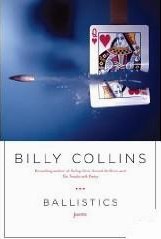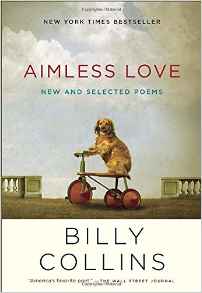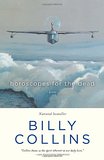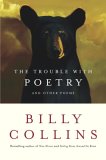Billy Collins
Billy Collins
 Books of Poetry (alphabetical).
Books of Poetry (alphabetical).
 Billy Collins exercise.
Billy Collins exercise.
 Time Line.
Time Line.
 Books.
Books.
Billy Collins featured in:
 Best American Poetry: 2013
(guest editor Denise Duhamel) with "Foundling".
Best American Poetry: 2013
(guest editor Denise Duhamel) with "Foundling".
 Best American Poetry: 2012
(guest editor Mark Doty) with "Delivery".
Best American Poetry: 2012
(guest editor Mark Doty) with "Delivery".
 Best American Poetry: 2011
(guest editor Kevin Young) with "Here and There".
Best American Poetry: 2011
(guest editor Kevin Young) with "Here and There".
 Best American Poetry: 2010
(guest editor Amy Gerstler) with "Grave".
Best American Poetry: 2010
(guest editor Amy Gerstler) with "Grave".
 Best American Poetry: 2007
(guest editor Heather McHugh) with "The New Today".
Best American Poetry: 2007
(guest editor Heather McHugh) with "The New Today".
 Best American Poetry: 2004
(guest editor Lyn Hejinian) with "The Centrifuge".
Best American Poetry: 2004
(guest editor Lyn Hejinian) with "The Centrifuge".
 Best American Poetry: 2003
(guest editor Yusef Komunyakaa) with "Litany".
Best American Poetry: 2003
(guest editor Yusef Komunyakaa) with "Litany".
 Best American Poetry: 2001
(guest editor Robert Hass) with
"Snow Day".
Best American Poetry: 2001
(guest editor Robert Hass) with
"Snow Day".
 Best American Poetry: 2000
(guest editor Rita Dove) with
"Man Listening to Disc".
Best American Poetry: 2000
(guest editor Rita Dove) with
"Man Listening to Disc".
 Best American Poetry: 1999
(guest editor Robert Bly) with "Dharma".
Best American Poetry: 1999
(guest editor Robert Bly) with "Dharma".
 Best American Poetry: 1998
(guest editor John Hollander) with "Lines Composed Over Three Thousand Miles from Tintern Abbey".
Best American Poetry: 1998
(guest editor John Hollander) with "Lines Composed Over Three Thousand Miles from Tintern Abbey".
 Best American Poetry: 1997
(guest editor
James Tate) with "Lines Lost Among Trees".
Best American Poetry: 1997
(guest editor
James Tate) with "Lines Lost Among Trees".
 Best American Poetry: 1993
(guest editor Louise Glück) with
"Tuesday, June 4th, 1991".
Best American Poetry: 1993
(guest editor Louise Glück) with
"Tuesday, June 4th, 1991".

|
|
|
Billy Collins' tenth collection of poetry.
Contents:
Billy Collins' first full-length collection of poetry.
A fine book in many ways, though also as usual smirky.
Or, to use a word that comes to Collins' mind in
"Passivity" (pp. 81-82):
"sneering".
Some of his old humor glitters, but
only in ways that Collins has trodden so thoroughly before that there is
little unexpected or amazing.
Worse, tinges of bitterness litter several poems, such as the title poem "Ballistics"
(pp. 31-32),
which hopes that the inspirational bullet shot through:
a recent collection of poems written
by someone of whom I am not fond
and that the bullet must have passed through
his writing with little resistance
...
and then through the author's photograph,
through the beard, the rounded glasses,
and that special poet's hat he loves to wear.
|
Is it meant to be funny?
If so, how sad that it sounds spiteful.
And what does one make of the tone set by the frontis-quotation from Ovid's
Metamorphoses:
"Even as a cow she was lovely."
However, pleasanter poems than the above include:
- "The Four-Moon Planet" (p. 12), though its genius is from Robert Frost,
in whose Notebooks Collins found: "I have envied the four-moon planet".
- "Aubard" (pp. 19-20).
- "Greek and Roman Statuary" (pp. 35-36), a list poem of loss, in a tone and
form that is a signature for Collins.
- "Carpe Diem" (pp. 43-44).
- "The Breather" (p.104).
He has one remarkable poem:
"(detail)" (pp. 66-67).
And indicates where some of his disgruntlement arises in poems like
"Separation" (pp. 73-74)
and
"Divorce" (p. 98).
The truest poem,
and one that will become dear to Camaldoli Retreatants, is "Quiet"
(pp. 37-39), which ends:
In fact, I had only a single afternoon
of total silence to show for myself,
a spring day in a cell in Big Sur,
twenty or so monks also silent in their nearby cells --
a community of Cameldolites [Collins' typo],
an order so stringent, my guide told me,
that they make the Benedictines,
whom they had had broken away from in the 11th century,
look like a bunch of Hell's Angels.
Out of a lifetime of running my mouth
and leaning on the horn of ego,
only a single afternoon of being truly quiet
on a high cliff with the Pacific spread out below,
.... Yet since then --
nothing but the racket of self-advertisement,
...
the little king of the voice having its say,
and today the pride of writing this down,
which must be the reason my pen
has turned its back on me to hide its face in its hands.
|
Acknowledges first publications in:
- Alehouse
- The Atlantic
- Bat City Review
- The Cortland Review
- Crazyhorse
- Five Points
- The Florida Review
- Fulcrum
- The Gettysburg Review
- London Review of Books
- The Massachusetts Review
- Mid-American Review
- New Ohio Review
- The New York Review of Books
- The New York Times Magazine
- The New Yorker
- The Paris Review
- Pleiades
- Poetry
- A Public Space
- The Recorder
- The Southampton Review
- Subtropics
- Triquarterly
- The Virginia Quarterly Review
- West 10th
Bright Wings: An Illustrated Anthology of Poems About Birds
Bright Wings: An Illustrated Anthology of Poems About Birds:
edited by Billy Collins; paintings by David Allen Sibley.
Collins' introduction includes (p.6):
|
The genre of poetry makes its true appearance at the very point along the line of verbal expression
where the possibilities of prose have been exhausted. The job of poetry, we might even say,
is to make sure that prose is never allowed to have the last word.
|
Favorite poems include:
- p. 36: Greg Delanty's "On the Marriage of Friends".
- p. 79: Elizabeth Bishop's "Sandpiper".
- p. 85: Wilfrid Wilson Gibson's "The Kittiwake".
- p. 96: Richard Wilbur's "A Barred Owl".
- pp. 97-98: Henry Timrod's "To a Captive Owl".
- p. 105: Edward Thomas' "The Owl".
- pp. 140-141: Lawrence Raab's "The Questions Poems Ask".
- pp. 154-156: Henry Wadsworth Longfellow's "The Emperor's Bird's-Nest".
- p. 193: Jonathan Aaron's "Cedar Waxwings".
- pp. 213-214: Billy Collins' "Christmas Sparrow" (from his Nine Horses).
- pp. 230-233: Wallace Stevens' "Thirteen Ways of Looking at a Blackbird".
- pp. 241-242: William Cowper's "The Faithful Friend".
- pp. 247-248: Brendan Constantine's "Rara Avis".
Horoscopes for the Dead
A fine book: less smirky and more sincere than earlier books, for example
Ballistics.
The opening poem
"Grave" (pp. 3-4)
appeared in
Best American Poetry 2010,
as well as Best Spiritual Writing 2011.
Favorite poems include:
"The Symbol" (pp. 64-65);
"What She Said" (pp. 68-69);
"My Hero" (p. 88).
The last two are also included in
Aimless Love (2013).
Acknowledges first publications in:
- The Atlantic
- Boulevard
- Cimarron Review
- Crazyhorse
- Five Points
- The Gettysburg Review
- Gulf Coast
- Knockout
- London Review of Books
- The New Yorker
- Oxford American
- The Paris Review
- PEN America 12: Correspondences
- Poetry
- Poetry East
- Poetry Review (U.K.)
- Open City
- Oranges and Sardines
- Real Simple
- Slate
- The Southampton Review
- The Southern Review
- Subtropics
- Superstition Review
- Tundra
Nine Horses
Acknowledges first publications in:
- The American Scholar
- Barrow Street
- Boulevard
- Brilliant Corners
- Crazyhorse
- Cream City Review
- Crowd
- Dominion Review
- Double Take
- Field
- Five Points
- The Gettysburg Review
- Green Mountains Review
- Kenyon Review
- New Delta Review
- The New Yorker
- Oxford American
- Ploughshares
- Poem and Plays
- Poetry
- Poetry New York
- Third Coast
- Tight
- Tin House
Accessible poems, written in common speech that one might use in conversation,
with a willingness to look death in the face.
In this, they remind me of the
(admittedly more romantic and less funny)
poems of Sara Teasdale.
In his introduction to
Best American Poetry 2006, Billy Collins specifies some selection criteria,
so it's interesting to see to what extent he follows his own criteria.
The sarcastic "The Student"
reinforces Collins' inclination to disagree with rules:
"My poetry instruction book,
which I bought at an outdoor stall along the river,
contains many rules
about what to avoid and what to follow.
More than two people in a poem
is a crowd, is one.
Mention the clothes you are wearing
as you compose, is another.
Avoid the word vortex,
the word velvety, and the word cicada.
..."
|
Here are some of
Collins'
Best American Poetry 2006 criteria, and Collins' tendencies:
- "A human voice speaking to me ... interested in my participation as a reader."
18 (almost half) of the poems sidle up to the reader and
address the reader as 'you', often meaning the generic you-as-audience,
sometimes implying the spouse, and sometimes naming a person.
- Opening lines that start "in the 'factual'": all his poems do that.
- He follow John Ciardi's: "flaws that prevented him from reading
any further. ... the mention of mythological beings and the apostrophe 'Oh!' found places
on his list." None were noticed.
- Collins cheerfully declares (implying the fickleness of such lists) that he cannot
read further in a poem with the word cicada.
Easy exercise for the reader: which cicada-bearing poem
entered this book?
- Poems that are largely memories, particularly of family members or of
items associated with a dead person.
While many of his poems are set in the present, he certainly reminisces.
- "Poems that presume an interest on my part
in the poet-speaker's psychic condition (usually misery)."
[They all do.]
And at least six (15%) of the poems are about the poet's process.
Data:
- 43 poems, one lead poem, and the rest divided into four similar-sized sections.
- 85 pages, about 2.0 pages per poem.
- Number of stanzas:
- None of the poems are written in a single stanza.
- 2 poems in 2-line stanzas.
- 16 poems in 3-line stanzas.
- 8 poems in 4-line stanzas.
- 1 poem in 5-line stanzas.
- 1 poem in 6-line stanzas.
- 2 poems in stanzas of 2-line and 3-lines.
- 1 sonnet-type poem.
- 12 poems in stanzas of variable (but usually six or fewer) lines.
- 30 poems need more than one page.
- A convenience sample of the first 10 poems in the book confirms that Collins continues to share with us
what he is wearing, eating, and drinking, like a miniature Pepys:
- Clothes are mentioned on average 1.2 times per poem, with the shirt being
the most popular (in 40% of the poems).
- Colors are mentioned on average 1.1 times per poem, with blue being the most popular
(in 30% of the poems).
- Food is mentioned about twice per poem, with a partiality to toast and bananas.
- Drink (beer, coffee, ice tea, milk, vodka) is mentioned in half the poems.
- A few other senses:
- Sounds are mentioned on average 0.7 times per poem, usually as a gerund
("humming", "whistling", "chirping", etc.).
- Flowers are mentioned on average 0.2 times per poem.
- Acknowledges first publications in:
- The American Scholar
- Atlanta Review
- The Atlantic Monthly
- Bat City Review
- Boulevard
- The Cortland Review
- Field
- Five Points
- Fulcrum
- The Gettysburg Review
- Hotel Amerika
- Living Forge
- London Review of Books
- The Massachusetts Review
- Michigan Quarterly Review
- Mississippi Review
- The Nation
- New Delta Review
- The New Republic
- The New Yorker
- Nightsun
- Oxford American
- The Paris Review
- Poetry
- Van Gogh's Ear
- Washington Square Review
- Western Humanities Review

|
- 1941.
- Born William J. ("Billy") Collins on March 22.
- 1968.
- Began teaching at Lehman College, New York.
- 1994.
- Poetry magazine selected him as "Poet of the Year".
- 1997.
- Recorded The Best Cigarette, a collection of his poems.
- 2000.
-
- 2001.
- Began first term as 44th Poet Laureate of the United States.
- Concluded as Distinguished Professor of English at Lehman College, City
University of New York.
- 2002.
- Began second term as 44th Poet Laureate of the United States.
- Published
Nine Horses.
- 2003.
- Ended double-term term as 44th Poet Laureate of the United States.
- 2004.
- New York State Poet for 2004.
- 2005.
- Published
The Trouble with Poetry and Other Poems.
- 2006.
- Billy Collins selected poems for Best American Poetry 2006.
- 2008.
- Published
Ballistics.
- 2010.
- Bright Wings: An Illustrated Anthology of Poems About Birds:
edited by Billy Collins; paintings by David Allen Sibley.
- 2011.
- Published
Horoscopes for the Dead.
- 2013.
- Published
Aimless Love : New and Selected Poems.
- Links and Books
-
[Thanks for visiting.]

 Ballistics (2008).
Ballistics (2008).
 Highlights of Poetry.
Highlights of Poetry.
 Index of poetry.
Index of poetry.
 How to Write Poetry.
How to Write Poetry.
 Haibun.
Haibun.
 Haiku.
Haiku.
 Hay(na)ku.
Hay(na)ku.
 Rengay.
Rengay.
 Tanka.
Tanka.
 Concrete.
Concrete.
 Ghazal.
Ghazal.
 Lai.
Lai.
 Pantoum.
Pantoum.
 Prose poem.
Prose poem.
 Rondeau.
Rondeau.
 Rubáiyát.
Rubáiyát.
 Sestina.
Sestina.
 Skaldic verse.
Skaldic verse.
 Sonnet.
Sonnet.
 Terza rima.
Terza rima.
 Triolet.
Triolet.
 Tritina.
Tritina.
 Villanelle.
Villanelle.
 Adam Zagajewski.
Adam Zagajewski.
 Aleda Shirley.
Aleda Shirley.
 Anne Carson.
Anne Carson.
 The Beowulf Poet.
The Beowulf Poet.
 Billy Collins.
Billy Collins.
 Billy Collins exercise.
Billy Collins exercise.
 Snorri's Edda.
Snorri's Edda.
 Carl Dennis.
Carl Dennis.
 Charles Atkinson.
Charles Atkinson.
 Chase Twichell.
Chase Twichell.
 Corey Marks.
Corey Marks.
 François Villon
François Villon
 Franz Wright.
Franz Wright.
 Galway Kinnell.
Galway Kinnell.
 Gary Young.
Gary Young.
 The Gawain Poet.
The Gawain Poet.
 Jack Gilbert.
Jack Gilbert.
 James Tate.
James Tate.
 Jane Hirshfield.
Jane Hirshfield.
 Jean Vengua.
Jean Vengua.
 J. Zimmerman.
J. Zimmerman.
 J. Zimmerman (haiku).
J. Zimmerman (haiku).
 J. Zimmerman (tanka).
J. Zimmerman (tanka).
 Jorie Graham.
Jorie Graham.
 Karen Braucher.
Karen Braucher.
 Karl Shapiro.
Karl Shapiro.
 Kay Ryan.
Kay Ryan.
 Britain;
Britain;
 USA.
USA.
 Len Anderson.
Len Anderson.
 Les Murray.
Les Murray.
 Li-Young Lee.
Li-Young Lee.
 Linda Pastan.
Linda Pastan.
 Louise Glück.
Louise Glück.
 Mary Oliver.
Mary Oliver.
 Nordic Skalds.
Nordic Skalds.
 Pulitzer Poetry Prize (U.S.A).
Pulitzer Poetry Prize (U.S.A).
 Richard Hugo.
Richard Hugo.
 Robert Bly.
Robert Bly.
 Sappho.
Sappho.
 Sara Teasdale.
Sara Teasdale.
 Shiki (haiku).
Shiki (haiku).
 Snorri's Edda.
Snorri's Edda.
 Stephen Dunn.
Stephen Dunn.
 Ted Kooser.
Ted Kooser.
 W.S. Merwin.
W.S. Merwin.




